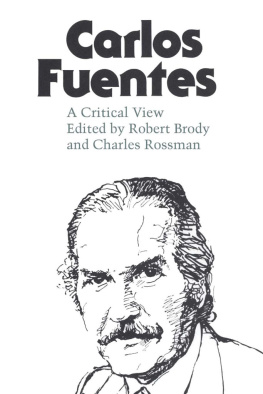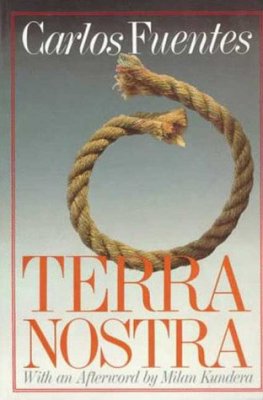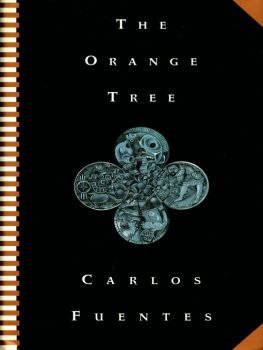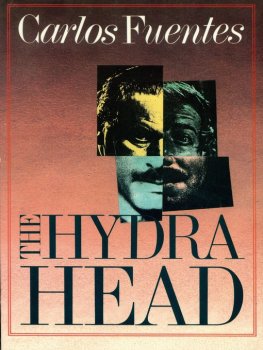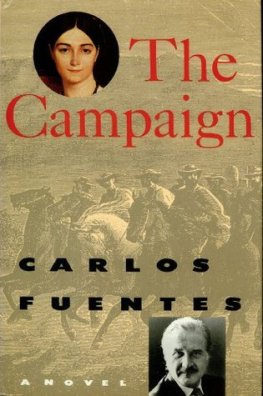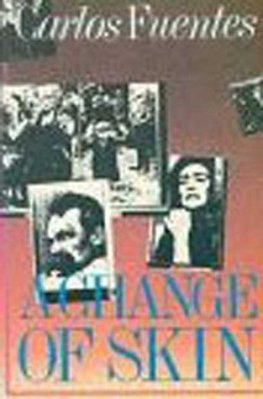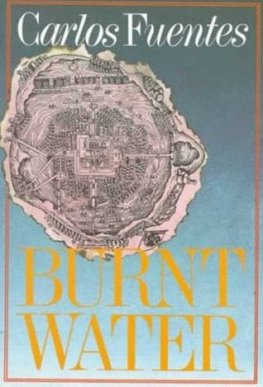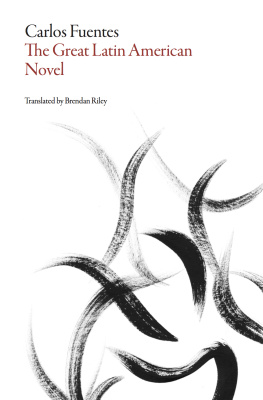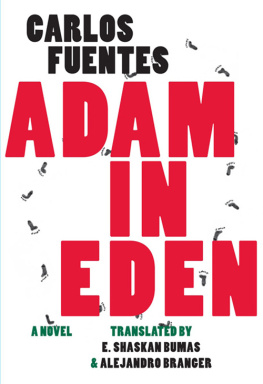The Texas Pan American Series
Carlos Fuentes
A Critical View
Edited by Robert Brody and Charles Rossman

University of Texas Press
Austin
Copyright 1982 by the University of Texas Press
All rights reserved
First Edition, 1982
Requests for permission to reproduce material from this work should be sent to Permissions, University of Texas Press, Box 7819, Austin, Texas 78712.
LIBRARY OF CONGRESS CATALOGING IN PUBLICATION DATA
Main entry under title.
Carlos Fuentes, a critical view.
(Texas Pan American Series)
1. Fuentes, CarlosCriticism and interpretationAddresses, essays, lectures. I. Brody, Robert. II. Rossman, Charles. III. Series.
PQ7297.F793Z618 1982 863 82-10851
ISBN 0-292-71077-1
The Texas Pan American Series is published with the assistance of a revolving publication fund established by the Pan American Sulphur Company.
ISBN 978-0-292-76231-2 (library e-book)
ISBN 978-0-292-76232-9 (individual e-book)
doi 10.7560/710771
Editors Introduction
Carlos Fuentes renown as a writer in the Hispanic world has been firmly established for quite some time. He is truly a modern master. Each new novel stimulates a spate of critical reviews in newspapers and magazines from Mexico to Buenos Aires to Barcelona, as well as more considered reactions in scholarly journals and academic seminars. In the past quarter-century his steadily increasing reputation has transcended the boundaries of Mexican and even Hispanic literature at large. His growing prestige in the English-speaking world is what prompts us to offer this critical symposium, the first of its kind in English, on the work of Carlos Fuentes. All the essays are the result of original research; they have never before appeared elsewhere in print, and most have been prepared especially for this volume.
Luis Leals opening essay presents its incisive analysis in a comprehensive manner which makes it perfect to introduce the rest. The reader not thoroughly familiar with Fuentes work will be able to follow his literary trajectory under Professor Leals critical guidance. We thought it best to present the next ten essays according to a pattern that roughly corresponds to the chronology of Fuentes narratives themselves. Some of these articles afford fresh studies or new perspectives on single works, such as Richard Reeves piece on La regin ms transparente, Jaime Alazrakis on Aura, Roberto Gonzlez Echevarras on Terra Nostra, Mary Davis on La cabeza de la hidra and Margaret Sayers Pedens on Una familia lejana. Others present comparative studies of two or more narrative works of Fuentes, such as John Brushwoods essay on the collections of stories, Los das enmascarados and Cantar de ciegos, and Frank Dausters on Aura, Zona sagrada, and Cumpleaos. Lanin Gyurko reaches outside Fuentes canon for his comparative study of the influence of Orson Welles film classic, Citizen Kane, on La muerte de Artemio Cruz. Malva Filer holds up two different genres for examination in her study of the interrelationships between Cambio de piel and the collection Tiempo mexicano. Gloria Durn traces the doll motif through several of Fuentes works. The last three essays deal with aspects of Fuentes work other than the narrative. Merlin Forster examines Fuentes plays, while Manuel Durn and George Wing concern themselves with two different sides of Fuentes the critic.
These fourteen essays offer an extraordinarily wide range of topics and of methodological approaches. We believe this critical range and diversity reflect similar characteristics in the creative work of Carlos Fuentes, a man of formidable intellectual energy and curiosity who also happens to be one of Latin Americas best writers.
This collection has been prepared with the reader of English especially in mind. Accordingly, we have asked our authors to quote from standard, readily available English translations of Carlos Fuentes works whenever possible. In all other cases, whether of quotations from Fuentes or of quotations from other Spanish texts, the authors have prepared English translations of their references. These English translations are then cited by page number to the original Spanish versions in footnotes accompanying each article. We have not, however, asked the authors to avoid using Spanish. Hence, a given work is sometimes referred to by its Spanish title, and sometimes by its English title. Other Spanish words and phrases appear throughout these essays, particularly during analyses of Fuentes style, when translation would rob the discussions of their point.
All quotations from the English translations of Fuentes major novels are cited in the text by page number to the following editions, which are published in New York by Farrar, Straus, and Giroux:
Where the Air Is Clear, translated by Sam Hileman, 1960;
The Death of Artemio Cruz, translated by Sam Hileman, 1964;
Aura, bilingual edition translated by Lysander Kemp, 1975;
A Change of Skin, translated by Sam Hileman, 1968;
Terra Nostra, translated by Margaret Sayers Peden, 1976; and
The Hydra Head, translated by Margaret Sayers Peden, 1978. Readers seeking fuller bibliographical information about the works of Carlos Fuentes, or about commentators on those works, should consult An Annotated Bibliography on Carlos Fuentes: 19491969, by Richard M. Reeve (Hispania, 53 [October 1970]: 595652), or Professor Reeves forthcoming book-length bibliography of Fuentes, to be published by Scarecrow Press, which will cover the period 194980.
Finally, the editors would like to thank Ms. Bettie Cook, of the Plan II office at the University of Texas, for her frequent assistance, often at very short notice, in preparing the manuscript.
Luis Leal
History and Myth in the Narrative of Carlos Fuentes
I believe profoundly in societies that do not kill the past.
Fuentes
Carlos Fuentes has stated that fiction can be useful in looking at history from new perspectives, and this is precisely what he has done in most of his novels, wherein he has presented a vision of history that cannot be gathered from the reading of history books. And, even more, he has reinterpreted history to present a new version of its development, a version reflected by a mind keenly conscious of the significance of past events in the shaping of the contemporary course of human events. In most of his novels he has gone one step further, to the recreation of history by the combination of realistic and mythical structures. The purpose of this essay is to trace the intrusion of history and myth upon Fuentes narrative, and to observe how he has solved the technical problems involved and yet has managed to produce novels that are aesthetically satisfying.
The interaction between history and myth is a topic that has aroused the interest of the philosopher, the historian, and the literary critic since ancient times. Among contemporary historians Arnold Toynbee has stated, History, like the drama and the novel, grew out of mythology, a primitive form of apprehension and expression in which... the line between fact and fiction is left undrawn. And if it is true, as he says, that history cannot entirely dispense with the fictional elements, it is also true that fiction cannot entirely dispense with the historical elements and technique. Lastly, says Toynbee, the drama and the novel do not present fictions, complete fictions and nothing but fictions regarding personal relationships. If they did, the product, instead of deserving Aristotles commendation that it was truer and more philosophical than history, would consist of nonsensical and intolerable fantasies.
Next page
